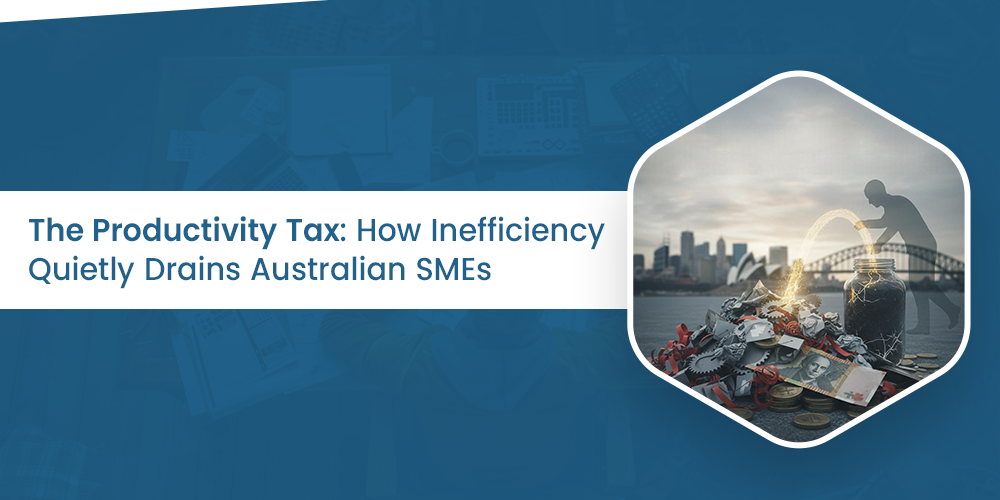
The Productivity Tax: How Inefficiency Quietly Drains Australian SMEs
Eversabz
Key Takeaways
• Inefficiency acts like a hidden tax on Australian SMEs, consuming time, money, and opportunities.
• Outdated systems and fragmented tools often prevent businesses from scaling sustainably.
• A marketplace mindset can transform operations by centralising hiring, procurement, and event management.
• EverSabz helps SMEs reclaim lost productivity and reinvest it into growth.
• Eliminating inefficiency is not just about saving costs — it is about unlocking potential.
Running a small or medium enterprise in Australia has never been easy, but many business owners underestimate the toll inefficiency takes on their operations. It is not a bill you receive in the mail or a line item in the budget. Instead, it is a silent drain on time, energy, and money that builds up day after day. This is the “productivity tax” and for countless SMEs, it is the difference between surviving and thriving.
When people think of business taxes, they imagine government obligations or financial reporting. But the productivity tax is much subtler and far more damaging. It shows up as staff working late to clean up spreadsheets, owners juggling endless vendor calls, or teams wasting hours on recruitment processes that yield the wrong candidates. Unlike official taxes, this one is optional — but only if businesses make deliberate choices to fix it.
Inefficiency thrives in fragmentation. Many SMEs rely on a patchwork of outdated tools, generic job boards, and ad hoc vendor relationships. Each of these systems may work in isolation, but together they create bottlenecks that sap resources. An employee spends two hours comparing supplier quotes because there is no centralised system. A manager fields dozens of irrelevant job applications because postings are scattered across unsuitable sites. A business owner loses days coordinating an event because procurement is disjointed. None of these activities feel like waste in the moment, but over time they represent thousands of hours lost and thousands of dollars left on the table.
The real danger of this productivity tax is that it keeps SMEs trapped in survival mode. Business owners and managers are so busy putting out fires that they cannot focus on strategy or innovation. Instead of pursuing new markets, they are caught reconciling data. Instead of building customer relationships, they are bogged down in paperwork. This is not just frustrating — it stifles growth. For SMEs to scale, they must first stop paying this hidden tax.
The answer lies in embracing a marketplace mindset. Rather than scattering energy across multiple systems and vendors, SMEs can consolidate their core needs in one central hub.
Platforms like EverSabz are designed to do exactly that. By offering procurement, job postings, and event management in one place, they strip away the inefficiencies that silently drain resources. What once took hours now takes minutes. What once felt overwhelming becomes manageable.
Consider procurement. In traditional setups, SMEs often juggle multiple suppliers, negotiate ad hoc deals, and lack visibility on pricing. This process is ripe for inefficiency. A marketplace centralises suppliers, enabling transparent comparisons and more consistent relationships. The result is not just cost savings but also reduced stress and more predictable outcomes.
Hiring is another area where the productivity tax takes its toll. Posting jobs on generic platforms often brings a flood of applicants, but quantity does not equal quality. Filtering through irrelevant resumes eats up valuable time, while the right candidates may slip away to competitors who can act faster. By centralising job postings within an SME-focused platform like EverSabz, businesses attract applicants who are better suited to their environment and can fill roles more efficiently.
Event management may seem like an occasional concern, but for SMEs it is often a high-stakes activity. A poorly managed event can cost more than just money — it can damage
reputation and morale. Without streamlined systems, organising suppliers, venues, and services becomes a logistical nightmare. A centralised platform changes that equation, ensuring that events stay within budget and align with business goals.
The impact of eliminating the productivity tax goes beyond efficiency. It creates space for SMEs to focus on what matters most. Imagine reclaiming hundreds of staff hours each year. That time could be spent improving customer experiences, developing new products, or pursuing strategic partnerships. Instead of reacting to problems, businesses can start planning for growth.
There is also a wider community impact. SMEs are the backbone of the Australian economy, employing millions and supporting local supply chains. When inefficiency holds them back, entire communities miss out on opportunities for jobs, services, and economic stability. Conversely, when SMEs embrace smarter systems and reduce waste, the benefits ripple outward. Stronger SMEs mean stronger communities.
The productivity tax will never send you an invoice, but it will quietly erode your business from within. It is the unpaid bill that grows larger the longer it is ignored. The good news is that SMEs do not need to accept this as an inevitable part of doing business. By adopting a marketplace mindset and leveraging platforms like EverSabz, they can stop paying the tax
and start investing in growth.
Scaling a business is not about working harder most SME owners already work harder than anyone else. It is about working smarter, removing friction, and building systems that enable progress rather than hinder it. The productivity tax thrives in silence, but once it is recognised, it can be eliminated. The future of Australian SMEs depends on it.
